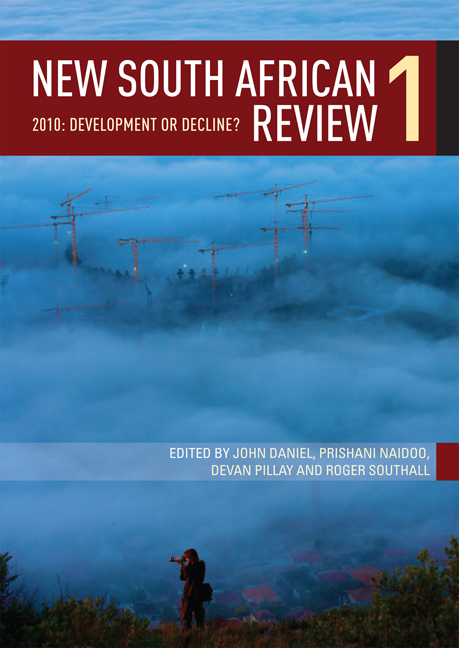Book contents
- Frontmatter
- Contents
- Preface
- Introduction South Africa 2010: From short-term success to long-term decline?
- PART 1 ECONOMY, ECOLOGY AND SUSTAINABILITY
- PART 2 STATE, POLITICS AND POLICY
- INTRODUCTION The politics and challenges of delivery
- CHAPTER 6 The African National Congress under Jacob Zuma
- CHAPTER 7 Indigent management: A strategic response to the struggles of the poor in post-apartheid South Africa
- CHAPTER 8 Fear, enervation and the systematisation of disorder: Challenges to reforming the Department of Home Affairs
- CHAPTER 9 The mobile nation: How migration continues to shape South Africa
- CHAPTER 10 South African female peacekeepers: An exploration of their experiences in the Democratic Republic of Congo
- PART 3 EDUCATION, HEALTH AND LAND
- PART 4 Doreen Atkinson
- Contributors
- Index
CHAPTER 9 - The mobile nation: How migration continues to shape South Africa
from PART 2 - STATE, POLITICS AND POLICY
Published online by Cambridge University Press: 21 April 2018
- Frontmatter
- Contents
- Preface
- Introduction South Africa 2010: From short-term success to long-term decline?
- PART 1 ECONOMY, ECOLOGY AND SUSTAINABILITY
- PART 2 STATE, POLITICS AND POLICY
- INTRODUCTION The politics and challenges of delivery
- CHAPTER 6 The African National Congress under Jacob Zuma
- CHAPTER 7 Indigent management: A strategic response to the struggles of the poor in post-apartheid South Africa
- CHAPTER 8 Fear, enervation and the systematisation of disorder: Challenges to reforming the Department of Home Affairs
- CHAPTER 9 The mobile nation: How migration continues to shape South Africa
- CHAPTER 10 South African female peacekeepers: An exploration of their experiences in the Democratic Republic of Congo
- PART 3 EDUCATION, HEALTH AND LAND
- PART 4 Doreen Atkinson
- Contributors
- Index
Summary
MOBILITY SHAPING THE NATION
South Africa's politics, economy, and social formations have been shaped historically by the elaborate regulation of human mobility and resistance to it. From the country's foundation, the majority of its residents – citizens and non-nationals – faced stark limitations on where they could live, and when and how they could move. The system of control was never as absolute or incorruptible as many imagine, but it has left the country with a socially and spatially fragmented population, suspicious of movements within and across its borders (see Crush et al 2008; Posel 1997). However, as the apartheid state's power waned in the late 1980s, so too did formal restrictions on movement into and within South Africa, and with the country's first democratic elections in 1994, South Africa's previously forbidden cities became primary destinations for migrants from around the country. Over time, they have also become increasingly important nodes for migrants from around the continent and beyond seeking profit, protection and the possibility of onward passage.
Political events in the past years – not only the continuation of xenophobic violence but a renewed call for ‘rural’ development – leave little doubt that human mobility, and attempts to reduce or prevent it, remains a potent concern shaping South African development and the self-understanding of the country's citizens and other residents. The language of responses to movement leaves little doubt that officials lack information, policies and capacities which would enable the country to predict and positively address its human mobility. That said, there are signs of change.
The aftermath of widespread violence against foreign nationals in May 2008 has given rise to new political debates about social cohesion and new international perceptions of the country. New policies were announced, and some of them implemented in relation to Zimbabwean migration (Polzer 2009). At long last, local governments have also begun recognising that migration – domestic and international, permanent and temporary – is an issue they cannot ignore.
Despite increased attention to human mobility in all its forms, the country remains without a coherent and shared perspective within government, or between government and the general public, regarding policy aims for South Africa and the region more broadly.
- Type
- Chapter
- Information
- New South African Review2010: Development or Decline?, pp. 218 - 235Publisher: Wits University PressPrint publication year: 2010



